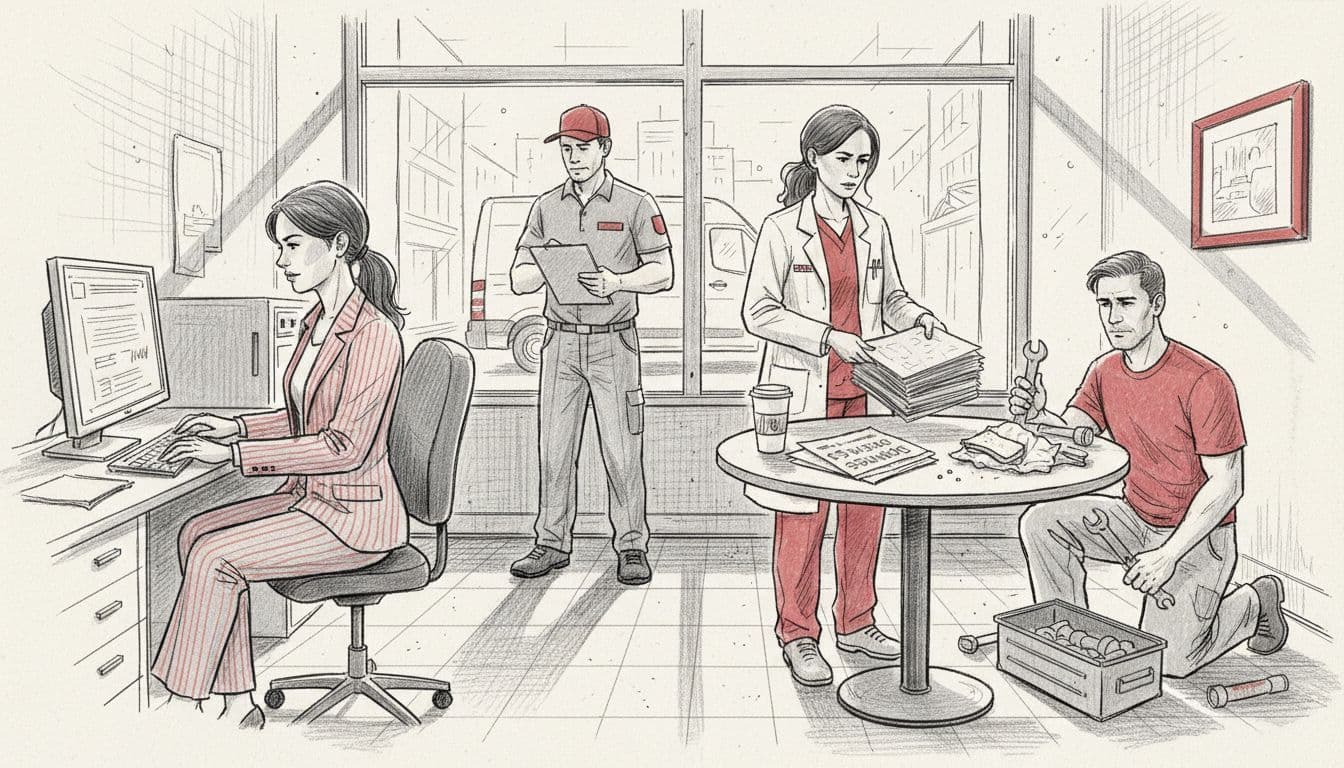Data-Driven Career Guidance: Using Labor Market Insights to Support Career Decisions
12.06.2024
Career Exploration

When you consider that the average person spends around 90,000 hours at work over their lifetime—more time than they spend with their spouse or children—the importance of making informed career decisions becomes starkly clear. As Umair Shaikh, founder of My Career Shop, often reminds us, career choices are life choices.
The traditional approach of making career decisions based solely on personal interests or family expectations no longer suffices in our digital world. The most effective career guidance combines robust labor market data with real-world insights from professionals who've walked the path before. This intersection of quantitative analysis and qualitative experience forms the cornerstone of My Career Shop's approach to career guidance.
As advisors and mentors, our role extends beyond simply sharing our experiences or pointing to job listings. We must help our mentees navigate an increasingly complex landscape where traditional career paths are being reimagined, new opportunities are emerging daily, and the skills valued by employers are constantly shifting.
This guide will equip you with the latest labor market insights, success patterns identified across professions, and practical frameworks for data-driven career guidance—all while maintaining the human element that makes career mentorship so powerful.
Understanding Modern Career Trajectories
Evolution of Traditional Career Paths
The notion of a linear career path—where one graduates, joins a company, and climbs the corporate ladder for 40 years—has become increasingly rare. Our interviews with professionals across fields reveal a more dynamic reality.
While the core trajectory of some professions, like medical school-residency path for doctors, remain relatively unchanged, it’s clear that many others won’t have the same luxury thanks to technological integration and changing patient/client expectations.
Alternatively, in law and accounting, the traditional partnership track is no longer the only measure of success. As Corporate Lawyer Sumaira Shaikh shared in an interview, “The concept of 9-to-5, being in the office, and all that kind of stuff has morphed and changed, and thank God for COVID - that's probably a perk that came from COVID. Society realized that they can work at home and have flexibility and people still get work done.”
Emerging Career Patterns
Perhaps the most striking development in modern career trajectories is the emergence of roles with significantly lower barriers to entry, but equally promising growth potential. Tech sales stands as a prime example. Unlike traditional professions requiring specific degrees and certifications, success in tech sales hinges more on soft skills and adaptability. As sales expert Kashif Khokhar explains:
"You don’t need deep technical experience or expertise to get started in Tech sales. You need some type of sales experience and honestly, you need to have the tenacity and persistence to really be successful. And I think you also need to be sociable, you need to be personable—people need to be able to have a conversation with you, you should be able to carry a conversation."
The cybersecurity field presents another fascinating case study in modern career evolution. With 3.5 million unfilled cybersecurity positions globally, it exemplifies how acute market demand can reshape entry paths. Professional certification programs and bootcamps are increasingly becoming viable alternatives to traditional four-year degrees.
Here are some of the other key patterns we're observing across professional landscapes:
1. Hybrid Skill Requirements
- Technical expertise blended with business acumen
- Strong emphasis on communication and relationship-building
- Project management abilities becoming universal requirements
2. Flexible Work Structures
- Remote-first options becoming standard
- Project-based work increasing
- Multiple income streams through consulting/advisory roles
- Geographic flexibility with digital-first operations
3. Accelerated Career Progression
- Merit-based advancement over tenure
- Emphasis on demonstrable skills over credentials
- Rapid specialization opportunities
- Clear performance-based compensation structures
The evolution we're witnessing isn't just about new jobs replacing old ones—it's about fundamental shifts in how careers develop and progress. UX designer Dave Hoffer has an astute take on one of the most important differentiators in any profession, "I’m a firm believer in this notion of lifelong learning... I can learn from any number of things on an ongoing basis."
Key Market Indicators for Career Guidance
Employment Demand Metrics
Understanding market demand is crucial for providing informed career guidance. However, as we've learned from My Career Shop's professional interviews, raw job numbers tell only part of the story. Let's examine the key indicators that paint a more complete picture.
Current Labor Shortage and Skills Gaps
The most dramatic example of market demand can be found in the skilled trades, with current projects showing a shortage of 2.1 million workers by 2030 in the US alone. As you read above, knowledge work sectors like cybersecurity are also facing critical shortage levels. But, as information security expert Craig Taylor highlights, there’s also a major opportunity for those with industry experience:
“Companies are scrambling to protect their assets, creating a high demand for cybersecurity expertise. With an estimated 750,000 unfilled cybersecurity jobs in the U.S. alone and millions globally, the need for skilled professionals is skyrocketing. For experienced cybersecurity practitioners, this presents an exciting opportunity to leverage expertise in a new, flexible way—by becoming advisors to organizations eager to improve their defenses and mitigate risks."
This skills gap creates unique opportunities for career entrants, but also raises important questions about preparation and training.
Regional Market Variations
Market demand isn't uniform across locations. For example:
- Tech hubs like New York, Washington, D.C., and San Francisco show consistently higher demand for technical roles
- There’s demand for medical specialists across the country, but particularly in rural areas and select urban Health Professional Shortage Areas (HSPAs)
- Remote work has created new patterns of demand, with over 30% of US companies now operating entirely remotely
Recession-Resistant Fields
Our interviews with professionals across sectors have revealed interesting patterns in career stability. As accountant Ankur Chawla notes, “The best thing about being a CPA is that it always keeps your options open. You learn so much from auditing, tax, compliance, and advisory work. Eventually, if you ever want to go into the industry, because of the vast knowledge you grasp over the course of your time, you can always do that. Whether it's public or private firms, accounting skills are in constant demand.”
Here are some of the other professional sectors that have consistent demand:
- Essential service status (healthcare, accounting)
- Regulatory requirements (legal, compliance)
- Crisis-critical skills (cybersecurity, risk management)
- Business transformation capabilities (tech sales, UX design)
Compensation Structures
Modern career guidance must account for increasingly diverse compensation models. Let's examine the key patterns emerging across different fields.
Traditional vs. Emerging Models
According to the Bureau of Labor Statistics, traditional professions typically follow established compensation structures. For instance, according to the Bureau of Labor Statistics, family physicians, lawyers, and accountants have the following salaries:
- Medicine: $235,930 median salary, varying by specialty and location
- Law: $145,760 starting salary for corporate law, with partnership potential
- Accounting: $79,880 median salary, varying by location
However, emerging fields often offer more variable compensation models. In tech sales, for example, our model might look something like:
- Base salary for entry-level SDRs ranging from $50,000 to $65,000
- Commission structures offering unlimited earning potential
- Additional incentives like equity and performance bonuses
In a recent interview, commercial account executive Kashif Khokhar explained the massive potential in this type of structure: “You can earn, you know there are account executives that I know are making $500,000 or more per year... typically with a pay mix of 60-40 or 70-30 sometimes 80-20.”
Career Progression Impact
Across all fields, we're seeing clear patterns in how experience influences earnings:
Early Career (0-5 years):
Traditional professions: Structured increases tied to milestones
- Legal: Post-bar exam salary jumps
- Medical: Post-residency compensation increase
- Accounting: Post-CPA examination boost
Emerging fields: Performance-based progression
- Tech Sales: Transitioning from SDR to Account Executive can increase commission compensation by 25%.
- UX Design: Moving from Junior to Senior UX Designer typically boosts salary by around 35%.
- Cybersecurity: Advancing from entry-level cybersecurity analyst to Security Engineer represents a 45% salary increase.
Mid-Career (5-15 years):
- Traditional paths: Partnership/leadership tracks
- Trending fields: Specialization premiums
- Consulting/independent work opportunities
While career paths and compensation structures vary significantly across industries, the data consistently shows that investing in professional development and achieving key career milestones leads to substantial earnings growth, regardless of whether one pursues a traditional or emerging career track.
Geographic Considerations
Location continues to impact compensation, but remote work is changing the landscape:
- About 45% of companies with remote options offer location-adjusted salaries
- Remote work enabling higher compensation while living in lower-cost areas
- Hybrid models creating new compensation calculations
Key Trends to Watch:
1. Skill-Based Premium
- Specialized technical skills commanding premium pay
- Cross-functional capabilities increasing value
- Impact of certification requirements on opportunity
2. Performance-Based Components
- Increasing adoption of variable compensation
- Project completion bonuses
- Client satisfaction metrics
- Team performance incentives
3. Total Compensation Evolution
- Equity compensation becoming more common
- Flexible benefits packages
- Professional development allowances
- Remote work stipends
As tech sales expert Kashif notes, "The job is not hard, but it is a grind... when you maximize your output, you will in turn eventually maximize your input, which is directly related to your income."
Critical Success Factors Across Professions
One of the most valuable insights from My Career Shop's professional interviews has been the identification of success patterns that transcend specific industries. Understanding these patterns enables advisors to provide more nuanced guidance, regardless of their mentee's chosen field.
Universal Skills
While technical requirements vary dramatically between professions, certain core competencies consistently emerge as critical to long-term success.
- Communication Excellence
As technical proficiency provides the foundation, clear communication and interpersonal skills often determine career trajectory. The ability to effectively explain complex concepts, influence decision-makers, and collaborate across teams consistently shapes advancement opportunities. Successful professionals across fields demonstrate:
- Clear articulation of complex concepts
- Adaptive communication styles for different audiences
- Strong written communication for documentation and reporting
- Effective remote communication skills
2. Attention to Detail
Whether reviewing legal contracts or debugging code, precision matters. This manifests differently across professions:
Traditional Fields:
- Medicine: Patient history accuracy
- Law: Contract precision
- Accounting: Financial statement accuracy
Trending Fields:
- Tech Sales: Client requirement documentation
- UX Design: User interaction details
- Cybersecurity: Security protocol implementation
3. Continuous Learning Mindset
Perhaps the most frequently cited success factor in our interviews is the commitment to ongoing development. This includes:
- Formal continuing education
- Self-directed learning
- Peer learning and knowledge sharing
- Industry trend monitoring
4. Professional Ethics and Integrity
While sometimes overlooked in career guidance discussions, ethical conduct also plays a role as a career success factor. Corporate attorney Sumaira Shaikh, recently highlighted this in the legal world, stating, “This is a career based on professional responsibility and ethics and making sure that you maintain that certain level of your morality at all times because it will get challenged.”
Industry-Specific Requirements
Beyond universal skills, each field demands particular technical competencies and credentials that advisors should understand.
Technical Competencies
The required technical skill depth varies significantly:
Traditional Professions:
- Medicine: Clinical skills, diagnostic abilities
- Law: Legal research, case analysis, court experience, contract drafting
- Accounting: Financial analysis, tax code knowledge
Trending Fields:
- Tech Sales: CRM proficiency, product knowledge
- UX Design: Design tools, user research methods
- Cybersecurity: Network security, threat analysis
Certifications and Credentials
Our research reveals varying approaches to validation:
Essential Credentials:
- Medicine: Board certifications
- Law: Bar admission
- Accounting: CPA licensure
- Cybersecurity: CISSP, Security+
Preferred Certifications:
- Tech Sales: Sales methodology certifications
- UX Design: Industry-specific certificates
- Project Management: PMP, Agile certifications
Experience Milestones
Career progression often hinges on specific experience markers:
Traditional Paths:
- Medicine: Residency completion
- Law: Associate to partner track
- Accounting: Public accounting experience
Trending Fields:
- Tech Sales: SDR to AE progression
- UX Design: Portfolio development
- Cybersecurity: Data security
In our same interview with Lawyer Sumaira Shaikh, she explains how important consistent performance and trust-building is to making the jump to partner track, "Partners are only going to trust you if you create good work product. If you create more work for your partner, they’re going to give it to someone else who makes less work for them."
Internal Networks:
- Mentor relationships
- Cross-functional collaborations
- Team leadership opportunities
External Networks:
- Professional associations
- Industry conferences
- Online communities
- Alumni networks
Success Pattern Analysis
Our interviews reveal consistent patterns in how professionals leverage these requirements:
Early Career Focus
- Technical skill development
- Credential acquisition
- Mentorship seeking
- Foundation building
Mid-Career Evolution
- Specialization development
- Leadership skill building
- Network expansion
- Industry contribution
Senior Career Transition
- Advisory roles
- Mentorship provision
- Industry influence
- Legacy building
Understanding these patterns helps advisors guide mentees through different career stages more effectively.
Future-Proofing Careers
Technology Impact
The acceleration of technological change affects every profession, though not always in the ways initially predicted. UX Designer Dave Hoffer is another expert to weigh in on the importance of artificial intelligence, stating that everyone, regardless of the point they are at in their career journey, needs to “learn what the AI tools can do today, keep a real close eye on what's coming out on a daily basis. One of those tools might be a really useful tool for you to use."
Here are some of the ways this technology is having an impact across fields:
Traditional Professions:
- Medicine: AI-assisted diagnostics, telemedicine platforms
- Law: Document automation, predictive analytics
- Accounting: Automated bookkeeping, tax preparation software
Trending Fields:
- Tech Sales: AI-powered CRM, predictive lead scoring
- UX Design: Automated testing, AI-generated prototypes
- Cybersecurity: Automated threat detection, AI security analysis
Success in knowledge work increasingly depends on finding the right balance between technological adaptation and human expertise—leveraging new tools and platforms to enhance rather than replace core professional capabilities.
Emerging Skill Requirements
Cross-cutting capabilities gaining importance:
- Data literacy
- Digital collaboration
- Process automation management
- Virtual communication
- Adaptive learning methods
Industry Evolution Patterns
Common trends across sectors:
- Integration of virtual and physical workflows
- Increased emphasis on data-driven decision making
- Growing importance of soft skills
- Rise of hybrid expertise requirements
The future belongs not to those who resist technological change, but to those who strategically embrace it while maintaining the human elements that technology cannot replicate.
Professional Development Paths
Continuous evolution requires a strategic approach to development. The rapid pace of technological change means professionals must constantly evaluate which emerging trends and tools will meaningfully impact their field versus what might be temporary distractions. This is especially true in tech-focused roles, but increasingly affects traditional professions as well, as technology reshapes how work gets done across all sectors.
Continuing Education Requirements
Professional licensing bodies across fields maintain strict continuing education requirements to ensure practitioners stay current. Formal requirements vary:
- Medicine: Physicians are typically required to complete 20 to 50 Continuing Medical Education (CME) hours annually, depending on the state and speciality.
- Law: Attorneys must fulfill Continuing Legal Education (CLE) credits, with requirements ranging from 12 to 15 credits per year, varying by state.
- Accounting: Certified Public Accountants (CPAs) usually have to complete 40 Continuing Professional Education (CPE) hours annually to maintain licensure.
- Cybersecurity: Professionals holding certifications like CISSP must earn 40 Continuing Professional Education (CPE) credits annually to renew their credentials.
Specialization Opportunities
As technology transforms industries, new specialization opportunities are emerging that blend traditional expertise with digital innovation. Strategic focus areas emerging:
- Medicine: Digital health integration
- Law: Technology law, privacy
- Tech Sales: Enterprise AI solutions
- UX Design: Mixed reality interfaces
Leadership Trajectories
The evolution of leadership roles reflects broader changes in how organizations operate and how value is created. Leadership trajectories include:
- Traditional management paths
- Technical leadership tracks
- Advisory positions
- Entrepreneurial opportunities
Practical Application for Advisors
Data-Driven Discussion Framework
Effective career guidance requires a structured approach to information gathering and analysis.
Key Questions for Advisees:
1. Market Analysis
- Industry growth trajectories
- Regional opportunity distribution
- Compensation expectations
- Skills gap analysis
2. Personal Alignment
- Work style preferences
- Learning capacity
- Risk tolerance
- Lifestyle requirements
3. Development Planning
- Education requirements
- Certification paths
- Experience milestones
- Network building
Critical Decision Points
Help advisees navigate key transitions:
- Education investment decisions
- Career entry timing
- Specialization choices
- Role transitions
Risk Assessment Approaches
Consider multiple factors:
- Market stability
- Skill transferability
- Geographic flexibility
- Financial implications
Resource Integration
Effective guidance combines multiple information sources:
Market Research Tools
- Industry reports
- Salary surveys
- Job market analytics
- Skills demand tracking
Professional Network Utilization
- My Career Shop podcast insights
- Alumni networks
- Professional associations
- Industry forums
Learn How Other Experts Leverage Their Experience at My Career Shop
The landscape of career guidance has evolved far beyond simple job matching. Today's effective career advisor must blend:
- Market intelligence
- Professional insights
- Technology awareness
- Personal development strategies
As our interviews consistently reveal, successful careers are built on the foundation of informed decisions, continuous adaptation, and strategic relationship building. By combining robust market data with real professional experiences, advisors can help guide the next generation of professionals toward sustainable, fulfilling careers.
At My Career Shop, we want to help potential advisors bridge the gap between market opportunities and individual potential. Sign up for our newsletter to get the latest insights.
Subscribe to My Career Shop Content
Stay up to date with Blog Posts and Podcast Episodes!
Your One Stop Shop For All Career Resources
Whether you are exploring new career paths, building your resume, or preparing for your next opportunity, our tools, templates, and guidance are designed to help you navigate your career journey with clarity and confidence.
Copyright © 2025 My Career Shop. All rights reserved.





























